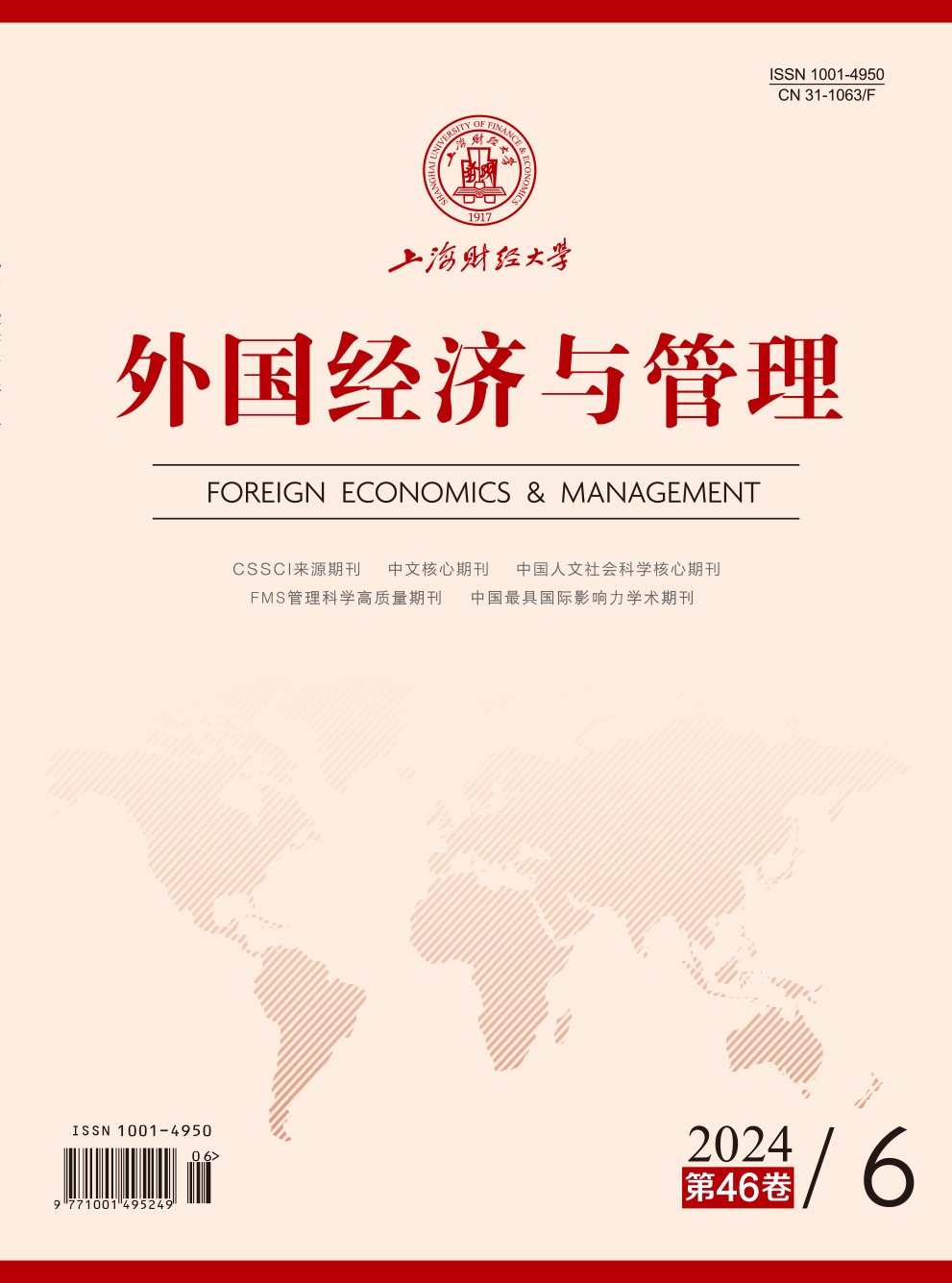本文基于数字创新扩散理论视角,以446家中国制造企业为调查对象,对制造企业数字创新的内在机制及其对不同类型的企业绩效影响关系进行探讨。结果表明:制造企业数字创新应聚焦流程数字化、产品智能化和服务数字化三个关键环节,其中流程数字化能够促进产品智能化,产品智能化对服务数字化有积极推动作用;进一步研究表明,流程数字化和产品智能化有利于企业提升创新绩效水平,流程数字化、产品智能化和服务数字化均有利于企业财务绩效提升;同时研究还发现,数字化投入持续性越强,越能增强产品智能化、服务数字化对创新绩效的促进作用,也能强化流程数字化、产品智能化、服务数字化对财务绩效的积极促进作用。本文在一定程度上揭示了制造企业数字创新实施的过程机制,细化了当前数字创新与企业绩效关系的笼统研究,深化和拓展了数字创新扩散理论。
制造企业数字创新的过程机制及其对企业绩效影响研究
摘要
参考文献
1 曹鑫, 欧阳桃花, 黄江明. 智能互联产品重塑企业边界研究: 小米案例[J]. 管理世界, 2022, 38(4): 125-141. DOI:10.3969/j.issn.1002-5502.2022.04.010
7 肖静华, 胡杨颂, 吴瑶. 成长品: 数据驱动的企业与用户互动创新案例研究[J]. 管理世界, 2020, 36(3): 183-204. DOI:10.3969/j.issn.1002-5502.2020.03.012
8 肖静华, 吴小龙, 谢康, 等. 信息技术驱动中国制造转型升级——美的智能制造跨越式战略变革纵向案例研究[J]. 管理世界, 2021, 37(3): 161-179,225. DOI:10.3969/j.issn.1002-5502.2021.03.011
11 余传鹏, 林春培, 张振刚, 等. 专业化知识搜寻、管理创新与企业绩效: 认知评价的调节作用[J]. 管理世界, 2020, 36(1): 146-166. DOI:10.3969/j.issn.1002-5502.2020.01.014
13 余芬, 樊霞. 高管认知、行业管制与企业创新持续性[J]. 科研管理, 2022, 43(12): 173-181. DOI:10.19571/j.cnki.1000-2995.2022.12.018
14 张振刚, 杨玉玲, 陈一华. 制造企业数字服务化: 数字赋能价值创造的内在机理研究[J]. 科学学与科学技术管理, 2022, 43(1): 38-56. DOI:10.3969/j.issn.1002-0241.2022.1.kxxykxjsgl202201003
15 Bogers M L A M, Garud R, Thomas L D W, et al. Digital innovation: Transforming research and practice[J]. Innovation, 2022, 24(1): 4-12. DOI:10.1080/14479338.2021.2005465
17 Del Giudice M, Scuotto V, Papa A, et al. A self-tuning model for smart manufacturing SMEs: Effects on digital innovation[J]. Journal of Product Innovation Management, 2021, 38(1): 68-89. DOI:10.1111/jpim.12560
18 Dong X S, Cao W L, Bao Y Q. Product intellectualization ecosystem: A framework through grounded theory and case analysis[J]. International Journal of Emerging Markets, 2022, 17(4): 1030-1048. DOI:10.1108/IJOEM-05-2021-0785
19 El-Haddadeh R. Digital innovation dynamics influence on organisational adoption: The case of cloud computing services[J]. Information Systems Frontiers, 2020, 22(4): 985-999. DOI:10.1007/s10796-019-09912-2
20 Hanelt A, Firk S, Hildebrandt B, et al. Digital M&A, digital innovation, and firm performance: An empirical investigation[J]. European Journal of Information Systems, 2021, 30(1): 3-26. DOI:10.1080/0960085X.2020.1747365
21 Hund A, Wagner H T, Beimborn D, et al. Digital innovation: Review and novel perspective[J]. The Journal of Strategic Information Systems, 2021, 30(4): 101695. DOI:10.1016/j.jsis.2021.101695
22 Kohtamäki M, Parida V, Patel P C, et al. The relationship between digitalization and servitization: The role of servitization in capturing the financial potential of digitalization[J]. Technological Forecasting and Social Change, 2020, 151: 119804. DOI:10.1016/j.techfore.2019.119804
23 Malhotra A, Majchrzak A. Hidden patterns of knowledge evolution in fluid digital innovation[J]. Innovation, 2022, 24(1): 35-46. DOI:10.1080/14479338.2021.1879653
24 Nambisan S, Lyytinen K, Majchrzak A, et al. Digital innovation management: Reinventing innovation management research in a digital world[J]. MIS Quarterly, 2017, 41(1): 223-238. DOI:10.25300/MISQ/2017/41:1.03
25 Paschou T, Rapaccini M, Adrodegari F, et al. Digital servitization in manufacturing: A systematic literature review and research agenda[J]. Industrial Marketing Management, 2020, 89: 278-292. DOI:10.1016/j.indmarman.2020.02.012
26 Pesch R, Endres H, Bouncken R B. Digital product innovation management: Balancing stability and fluidity through formalization[J]. Journal of Product Innovation Management, 2021, 38(6): 726-744. DOI:10.1111/jpim.12609
27 Podsakoff P M, MacKenzie S B, Lee J Y, et al. Common method biases in behavioral research: A critical review of the literature and recommended remedies[J]. Journal of Applied Psychology, 2003, 88(5): 879-903. DOI:10.1037/0021-9010.88.5.879
28 Ramdani B, Raja S, Kayumova M. Digital innovation in SMEs: A systematic review, synthesis and research agenda[J]. Information Technology for Development, 2022, 28(1): 56-80. DOI:10.1080/02681102.2021.1893148
29 Shen L, Zhang X, Liu H D. Digital technology adoption, digital dynamic capability, and digital transformation performance of textile industry: Moderating role of digital innovation orientation[J]. Managerial and Decision Economics, 2022, 43(6): 2038-2054. DOI:10.1002/mde.3507
30 Shi Y F, Cui T R, Kurnia S. Value co-creation for digital innovation: An interorganizational boundary-spanning perspective[J]. Information & Management, 2023, 60(5): 103817.
31 Soluk J, Kammerlander N. Digital transformation in family-owned mittelstand firms: A dynamic capabilities perspective[J]. European Journal of Information Systems, 2021, 30(6): 676-711. DOI:10.1080/0960085X.2020.1857666
32 Soluk J. Organisations' resources and external shocks: Exploring digital innovation in family Firms[J]. Industry and Innovation, 2022, 29(6): 792-824. DOI:10.1080/13662716.2022.2065971
33 Urbinati A, Manelli L, Frattini F, et al. The digital transformation of the innovation process: Orchestration mechanisms and future research directions[J]. Innovation, 2022, 24(1): 65-85. DOI:10.1080/14479338.2021.1963736
34 Wei S B, Xu D B, Liu H. The effects of information technology capability and knowledge base on digital innovation: The moderating role of institutional environments[J]. European Journal of Innovation Management, 2022, 25(3): 720-740. DOI:10.1108/EJIM-08-2020-0324
35 Wu L F, Sun L W, Chang Q, et al. How do digitalization capabilities enable open innovation in manufacturing enterprises? A multiple case study based on resource integration perspective[J]. Technological Forecasting and Social Change, 2022, 184: 122019. DOI:10.1016/j.techfore.2022.122019
引用本文
张振刚, 户安涛, 叶宝升. 制造企业数字创新的过程机制及其对企业绩效影响研究[J]. 外国经济与管理, 2024, 46(6): 83-97.
导出参考文献,格式为:
上一篇:幽默广告对品牌性别的影响研究





 6037
6037  8286
8286

